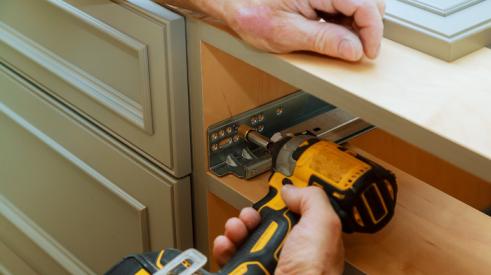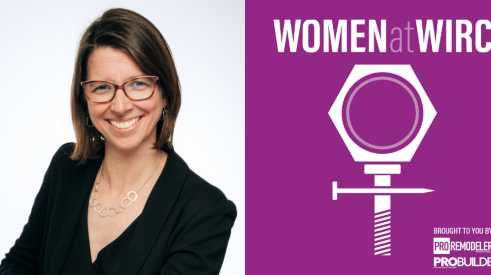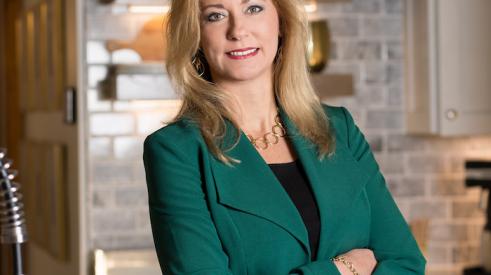|
 |
|
Tom Swartz |
What are the advantages and disadvantages of running a specialty or full-service company during a market slowdown? How does that affect your approach to marketing, sales and financing? There is opportunity for success no matter what type of remodeling business you run.
Read the complete discussion below or link to the podcast to listen to the conversation.
Tom: Today, in the news — USA Today — there's a lot of talk about slowdown, maybe a recession, depending on whom you're talking to. Housing is hit especially hard. Does that include remodeling and home improvement in your case, full-line remodeling?
John: Yes, certainly anything can affect it. I don't anticipate it affecting our market as much as some other markets or areas of talent. In the area we work in, I don't think it will affect it greatly.
Tom: John, tell us exactly what you do as "full-line remodeling" company.
John: We do design/build/remodel. We take the job from conception all the way through to completion. We build all of our own cabinets, do our own painting, tile work, framing and trim carpentry in-house. We sub out the electrical, mechanical and plumbing. Everything else is done in-house.
Tom: You sub out electrical, heat and plumbing and you do everything else, for all intentions and purposes, including foundations?
John: Sometimes we do it ourselves. If it gets to be too large, we'll sub that out. The painting we do in-house.
Tom: Bob, define what you do. You're a $5.5 million to $6 million company with six employees. You have more names for you company than you have employees! (I'm being facetious.) Would if be true to say that Amazing Siding would be a specialized area as opposed to full-line?
Bob: Yes. We're a specialty remodeler specializing in siding, replacement windows and replacement patio doors. We basically specialize in home exteriors.
Tom: Roofs?
Bob: Rarely. We sub it out and don't do the roof.
Tom: You stay away from that. You're getting very specific. That's why you two are great. I've talked to a number of people and find this fascinating. Bob, you're very specific on siding and replacement windows and doors. Rarely do you get into other things or you're forced into other things, mostly. Whereas with John, they started out with one guy 15 years ago and now does full-line design/build and things like that. John, today when you read things, the talk is about slowdowns, especially in housing and things of that nature. I was at the Builders' Show in Orlando. Remodeling actually got on the radar screen in the media. They said remodeling projects would be put on hold, and they went into 11 different areas. Tell us what you think. Does the slowdown affect remodeling or, in your case, specialized remodeling and home improvement?
 |
|
Bob Birner |
Bob: I think it can affect it. Obviously if you had a "black Monday" depression-era type of collapse. Living in Houston, Texas, we're the energy capital of the world, so we're pretty well-insulated with the price of oil now being just over $100 per barrel. That helps us. That being said, I'm not a firm believer in the media hype. We've been in business long enough to know that every time there's an election, regardless which party is in power, the economy is politicized. There's a lot of hype. The reality is the majority of companies out there, the less educated, cease doing business, meaning they'll cut back on advertising and marketing because they believe it's going to be a slow year. They're exactly right — it's a self-fulfilling prophecy. My philosophy is, if they keep doing that, I'll keep running my business. I'm typically able to gain market share because of that.
Tom: You've got a number of words of wisdom in that answer! Interesting. Bob, it seems to be the impression by some that replacement jobs sell better than design/build in general in a soft market. Do you agree with that? Maybe Houston is insulated somewhat. It may be if oil goes up to $100, and maybe if oil comes back to $70. It depends on who you listen to.
Bob: I would agree with that, particularly right now. With the energy cost being what it is, one of the benefits of upgrading to replacement windows is that you can improve your home's energy efficiency. With the green building and remodeling movement gaining such popularity, this ties in with that as well. Certainly, that gives us a bit of a competitive edge, in my opinion, over a design/build/remodeler who could make the most absolutely breathtaking kitchen you've ever seen, but it very well may not be something that's going to improve someone's energy bill. Yes, it will include their quality of life and pride in their home, but it's not going to help them from an energy-efficient standpoint.
Tom: John, the question then is, in a soft market that's the impression anyway. The replacement jobs will sell better than the design/build. Do you agree with that?
 |
|
John Gillette |
John: I do, in respect of the size of the job. In larger jobs in design/build, they won't sell as well because people aren't putting as much in their homes. They're afraid to spend as much of their savings or invest into the house as much in a soft market. They want to hold on to what they have. But, if it's a smaller job, I think they'll sell just as well in a soft market.
Tom: John, you mentioned your sales last year in 2007 was approximately $2.5 million. You've been that way for three years and are expecting to increase to 10 percent or maybe as high as 20 percent this year. How do you plan to do that? What's going to be different this year than where you were last year?
John: The structure within the business itself; having the proper supervision for the jobs and for sales of the jobs. What I've done before was I had three project managers, three years ago when it was $3.5 million. The quality went down. I went back to overseeing every job myself. Now, I've developed and trained people to give the quality that I expect. I have those people in place now to be able to do more sales.
Tom: Better quality of business management.
John: Correct.
Tom: Bob, compare to your sales. You said you were at $5 million to $5.5 million and you plan to go on to 10 percent. You're thinking higher than that, maybe 15 to 20 percent. How are you going to do that?
Bob: A lot of it is simply the law of supply and demand. Again, I'm in Houston, Texas. The energy bills keep going through the roof. As they continue to go higher, people are going to look for more and more ways by which to save on their energy bills. If I have a solution and can show them where I can save them money on their energy bills and improve their home's value and get a good return on their investment, that certainly is an easier sale for me to make.
Tom: That makes sense. Bob, just as a side note, Amazing Siding has several locations throughout the country. How many?
Bob: We have 12 locations.
Tom: Twelve locations. Name three or four of the furthest, diverse cities that they are in.
Bob: We have one in Charlotte, N. C., and one in Portland, Ore. We have offices coast to coast. Obviously, not filled in all the way, but we are coast-to-coast as the crow flies.
Tom: Portland is a pretty good market, correct?
Bob: It is a very good market.
Tom: With several locations throughout the country, 12 in all, do you see a difference in sales — slowdown or increase — from those locations? Are they all doing the same or is there one that stands out, either doing good, or they are being affected by the slowdown?
Bob: There is a little bit of a slowdown in some of the other markets, but I'm not a big believer in that talk. It just motivates me even more. I look at an economic slowdown as an economic opportunity for my company and my business. That's the way I try to run my business; I'm an eternal optimist.
Tom: It motivates you to look at the economic opportunities.
Bob: It does, but I also know that when things slow down, so many companies are ready to "throw in the towel." When things slow down, you do notice a little hiccup from time to time, which is a normal part of the business cycle. That's when I look inward. We try to look at ourselves in the mirror. Is this the time to upgrade or brand and our image, trademarking, our logo and things of that nature? We look at all of our systems, our business offer that we utilize, etc. We try to upgrade those things. This way, we're poised, we're ready, we've got the systems perfected. When the economy does come back in a boom — and it will, and I think it will very shortly — we're prepared to leap and bound ahead of our competition.
Tom: I like your optimism. John, do you share that optimism?
John: Yes. Bob, you think that the next year will be a good year, don't you?
Bob: Yes, I do. Just from the clientele that we have. That's the difference in being able to build the business this year. We had to turn away jobs last year. We're already pretty well set for this year with jobs for the upcoming year.
Tom: When I went to the Builders' Show, I went with both of your optimistic areas. Our sales happen to be up this year, too. What I walked away with was that new home development had been hit pretty hard with their financing. Bob, do you use financing in your business and, if so, how has it been affected?
Bob: We use financing. I'd say 50 to 55 percent of our projects are financed. Of that, I'd say 95 percent is a same-as-cash type financing, or a no-payment, differed interest type of plan where the client has almost a year or right at a year to pay off the entire balance of the project. Keep in mind, my average ticket is about $13,000. The design/build project is way north of that!
Tom: With the financing that you use, do you do that through a local banking institution or a national financing company, or both?
Bob: A national financing company on the 95 percent to 5 percent. When we're doing a home equity or home improvement loan, that's done locally.
Tom: John, do you use financing at all? Do your customers usually go out and get it themselves?
John: The customers get it themselves.
Tom: Would you say that that's the big difference between full-line and specialized?
John: Yes, I would.
Tom: Do you see any other way that financing plays a part in your custom build business?
John: No. Most of the homeowners get a home equity loan for their financing. The majority of the ones we work for are actually either selling stock or they've saved up the money for the project.
Bob: It's your indication that the economy hasn't affected these people that much?
John: Not the ones we're dealing with. I specialize in a certain area of town, which keeps me away from being affected by a lot of things that affect other people. My biggest problem with a slowdown or soft market or a turn in housing is that your builders turn into remodelers, trying to fill in the gaps. They really hurt the market with what they try to do as far as markups and things like that. They come in at a lot less, not knowing what they're really getting into.
Tom: Interesting.
Bob: That's something I'm totally insulated from.
Tom: You're insulated from that, Bob. I was coming to that.
Bob: Yes.
Tom: You're insulated from the builder-turned-remodeler. The builder thinks that a room addition is just a little house. They'll just build the full line custom as planned and everything else a home does, so it's got to be the same. We know it's not. Whereas with home improvement, you've got enough problems, we'll look at all the years of headaches and not even tough it. Is that fair?
Bob: Typically, your larger builders are going to have an architect. Frankly, those things just aren't needed in single-line specialty remodeling like we do. What happens is they're paying for infrastructure that they don't use. It's not cost effective for their business model to delve into that field.
John: They also don't plan for people being in and working on the house while the homeowner is there and all the other things that are tied into it.
Tom: It's a totally different animal.
Bob: An analogy that I heard, an old joke: there was a motorcycle mechanic and a cardiovascular surgeon in the airplane. They start a conversation. The mechanic says to the surgeon, "We both do surgery on the hearts of the patients that we work on. How come you get paid more than I do, Mr. surgeon?" The heart surgeon says, "Well, I do mine with the engine running!" I think that's the difference between remodeling and new construction. The homeowner is there.
Tom: That makes a lot of sense. We'll move in on a couple of things. Bob, lets switch to your business. Could you tell us approximately how much you spend on advertising and marketing, and do you see those two things as different animals?
Bob: I do see them as different animals. I think that they dovetail together, obviously, because just by the definition of advertising slash marketing. It depends. Marketing, to me, is branding. Advertising, to me, is direct response.
Tom: One leads to top-of-the-line awareness and the other is lead generation.
Bob: Yes.
Tom: What do you spend, approximately, and maybe just a percentage. Do you have a budget?
Bob: I have every penny allocated for my entire year; while it does change during the course of the year. We do projections — where we're going to spend, how much we're going to spend. We have a marketing plan in place that we follow and monitor closely throughout the year.
Tom: I'll bet it's not cheap.
Bob: No.
Tom: You spend a fair amount of time making sure that people know who you are and how to get hold of you.
Bob: Exactly. If you're not proud of who you are and you aren't standing on a street corner saying, "Hey, this is who we are!" and you're not excited about it, you can't expect anyone else to be excited about you. We preach to the masses.
Tom: What are your three top marketing tools?
Bob: The Internet. Talk radio.
Tom: You do a talk radio in Houston every Saturday, right?
Bob: Every Sunday morning. And then, finally, direct mail.
Tom: With specials and also about your company.
Bob: These are stand-alone direct mail pieces. It's not a marriage type mail product where it's bundled in with other companies or vendors. It's our own unique piece that we mail ourselves.
Tom: The direct mail: who do you send that to?
Bob: Homeowners who meet the demographic criteria that we've set out as the ideal customer. We've basically analyzed our database, acquired the demographic data of our best customers. We've taken clones of those best customers and bought a list.
Tom: Would it be safe to say that you send them to your past customers as well?
Bob: Yes. They are obviously going to be included in that mailing list. It's always made out to the individual, not to "current resident" or "homeowner."
Tom: John, do you do advertising and marketing for your company?
John: The advertising we do is only with yard signs and the signs on the vehicles.
Tom: Do you advertise in the paper or anything?
John: No. We also use the Internet. We have a Web site.
Tom: Do you get many hits on it?
John: Yes, we get about four a month.
Tom: Do you have a set budget for how much you spend on advertising and marketing?
John: No, I do not.
Tom: You don't because you know how much the yard signs and those on the trucks and the Internet and how it plays in there. Marketing and advertising is not a major part of lead generation for your company, is that fair?
John: Yes. The signs are one of the biggest things for us. They're the biggest lead generators. And then, word of mouth. We work in a very small area. When I mentioned "hits" on the Internet, that means how many calls we get from the Internet a month. A lot of ours is word of mouth. The marketing that I referred to is the extra customer service that we do. We do charity projects, help out with the Boy Scouts, with people that are past customers, and things like that. We do little extras for past customers, repairs, etc., and don't charge for certain things to keep our name out there.
Tom: John, do you go to any local home shows?
John: I haven't in the last two years. I did for a number of years, three times a year. We had to turn away work last year. We're busy enough; we have the leads and sales. We just have to be able to get the work done.
Tom: It's a situation where, if you go to a home show, it may be such that if you got leads and a good response, you'd have trouble producing it anyway.
John: Yes. The hardest part for us is that we end up referring most of our competitors. In the small area that we work in most of it is from other parts of the city. We're referring other customers. I'd rather work the remodeler's booth from the Remodelers Council to help out than I would to have my own booth.
Tom: Maybe Bob would like you to put one in, he'll pay for your booth, and you can refer the leads to him! Bob, do you do local home shows?
Bob: Yes.
Tom: How many?
Bob: In the past, we've done about seven to nine a year.
Tom: See the big difference? That's more lead generation or top-of-mind awareness or both?
Bob: Both. I concur with what John's saying. We cover about a 100-mile radius out of Houston. It's obviously very lucrative for us to be at many of these events. If we covered a smaller territory, it just wouldn't be cost effective for us. That's why it's more beneficial for us to have them.
John: I used it to get our name started. Once we got established, it's not cost effective anymore. The other thing about being a full-service company is that we get referred by word of mouth a lot more, because we do everything. Anything that comes up with the home, our name should come up.
Tom: Are referrals an important part of your business now?
John: Yes, about 75 percent last year.
Tom: Do you track that, Bob?
Bob: Yes, I do.
Tom: Is it higher or lower than that?
Bob: It's lower than that but I'm working to get it higher.
Tom: John, do you have a handle on what your average job might be approximately?
John: The average job was $252,000 last year.
Tom: $252,000 was the average. John, do you find yourself at any time thinking it's necessary to lower prices to keep the volume going?
John: That's what I did about four years ago to try to keep up with the builders coming in doing their small markups.
Tom: Was that successful?
John: It was successful for the customer, but not for me. It was hard to stay in business.
Tom: Bob, do you ever find yourself lowering prices or offering specials that are going to keep pricing down?
Bob: Not particularly. The way my business model is set up, we mark our products up a percentage over the labor and material costs. With inflation and the ever increasing labor rates, which lately have been pretty good, but with materials in particular. As those things go up, we don't have the ability to do that. My philosophy is that if I have to lower my price in order to earn someone's business, my salespeople aren't conveying the quality of work that we deliver, then we have a problem with our sales — we don't have a problem with the customers' ability to digest the price.
Tom: That's a good message. Let me go with one last question that I have and then get some comments from you. Bob, since the financing is part of your sales strategy and you use it quite a bit — 50 percent of the time, it appears — is it getting tougher to get people to use it or get them approved today?
Bob: I don't think so. One of the things that we do — and one of the reasons I think that we've been so successful — is that we qualify for financing. There are many companies that don't have the relationship or financial stability by which they can qualify for many of these financing programs. Automatically, that gives me a competitive advantage over my competition: that's No. 1. No. 2: my business is still a one-call close. Where John, in design/build type projects, it's sometimes multiple calls in order to consummate the project. The ability for us to basically do all the legwork for the client and say, "We'll do the project and the financing for you," certainly, they have the ability to read the fine print and see what the rates are and things of that nature. But the simple fact of the matter is we will do more in financing this week than my customers will probably do in their lifetime. Because we have multiple locations, I can give them economies of scale. I can give them very competitive interest rates. Most people, with today's busy lifestyle, would be glad not to have to go to the bank if we can give them a competitive rate for the project. We do that for them at no charge as a part of the service we provide in our company.
Tom: So, it's safe to say that the myth of going to a national company, where you'd have to pay three, four, five or more percentage points above than a bank will allow, is just that.
Bob: What we're able to do is establish local relationships. When we have the home equity, home improvement loans at each one of our locations, we have a personal relationship with those lending institutions. We have the big stuff, but we can also take care of the little stuff. I think a lot of it is just having that good personal relationship in working with a lending institution that looks for reasons to say yes. My experience has been that most lenders look for reasons to disqualify an applicant for a loan. I want the type that looks for reasons to qualify them for a loan. That's a big thing.
Tom: John, do you see any of your clients having problems with financing? The ones who do secondary and go and refinance who approach it differently? Are you having any problems at all with that?
John: No, not that I'm aware of. I haven't lost anything because of it. I haven't had anyone say they would have to try another avenue before we start the project.
Tom: John, if today's discussion is specialized versus full-line remodeling, I've always said that I think remodeling is a very unique industry. You're always wanting to be something you're not: if you're big you want to be small, if you're small you want to be big, if your full-line, you want to be specialized, if you're single-line, you want to be full-line. If you just do remodeling, you want to do insurance. If you just do insurance you say, "I want to do this." You're always looking for other ways of doing it. What advice would you give a remodeling contractor who is struggling with what they want to do, and how they can best do it? If they want to get into full-line versus specialized, what would you tell them?
John: I would say that you have to do what you're able to do best and really enjoy it. First you've got to enjoy it to be able to deal with it. I choose to have full-time employees so I can feel more control over the jobs, especially with remodeling versus new construction. We have people there every day of the week. That's harder to do if you sub it out. It's harder to get someone to come in and frame a small bathroom as a sub versus full-time people. It's a service company. If you want to do service and deal with the customers, then it's a great line of work to get into. Tom, I'm not sure if I answered this correctly. If someone wanted to come into the business or if someone is trying to switch from one?
Tom: You did it. You went from a one-man trim carpenter type of company to a full-line. If someone wanted to grow like that, would you have any special advice for them?
John: To get the best qualified people he could get to do the work to help him. Get the best employees he can.
Tom: Bob, words of wisdom to someone that is struggling right now. Once you think you know it, learning stops. If someone comes to you and wants to be like you, what advice would you give a person, either in full-line wanting to specialize, because that business isn't there, or someone getting into the business and wanting to turn into a successful professional like yourself. What advice would you give?
Bob: I'd probably echo a little of what John mentioned. You want to surround yourself with good quality people. One of the biggest things people do is they mis-hire. Let me elaborate. They'll hire someone who "thinks just like me. When I'm out of the office it will be just like I'm there!" That's great to have, but I think a lot of people go after people who think the exact same way that they do. While that is good from a management standpoint, to get certain things done, the weakness is that they'll be the people who have the same weaknesses that you have as a manager. Sometimes one has to look in the mirror and found what their individual weakness is, and that they hire people who have strengths where they may have a personal weakness. So that nothing falls through the cracks. I also think you should hire people to do a job and let them do the job. If you hire an expert, whether it's a very seasoned or skilled sales person, give them the tools to succeed and let them do their job! Don't micromanage. Yes, you want to be on top of what they're doing, but let them do their job — just make sure you have a complete understanding of what's going on.
Tom: I'll summarize this in a few minutes here, if I can. You've given a vast amount of information on a subject, and we're not through. There's a lot of things that can be said. We have Bob Birner who has a specialized company, Amazing Siding, Renewal by Andersen Window and Door Replacement. We also have John Gillette from Craftsmanship by John, who does it all: design build from conception to completion. Building all things from foundation to cabinets, tile, frame, trim painting, subbing only the mechanical. There's a difference of how to approach a particular business.
We talked about the slow down. We found that with $100 a barrel for oil, maybe it doesn't affect us in the energy capital of the U.S. Bob brought up the fact that if you look at history and see that election years are always volatile because of the nature of the political system that we have. If you read enough and listen to CNN enough, you'll find the whole world is going to heck in a handbasket. You start cutting back. Bob used the words that it's a self-fulfilling prophecy. The first place to cut back is on advertising and marketing. In a soft market, replacement sells better. If replacement does sell better, because of green remodeling, because of the size of the job, the larger ones have a bigger ticket item. History will show that they probably read the paper too, so they're probably not going to do as much. You haven't seen that in Houston, but you're feeling is probably that way in other areas. If we had a difference from last year, you're saying it's simple supply and demand and energy and energy is always going up. The window and door replacement business is probably a good place to be.
In John's case, it's going to be better this year. He went to a different area where he has systems and procedures in place, has proper supervision. Now he's ready to grow because he has a better quality of business management in and of itself.
We talked about locations in 12 places. A little slow down, but you're motivated to look at economic opportunities. You look inward at a time to upgrade and things like that.
You do a lot of financing, Bob. John, you let your customers take care of theirs. Bob's average ticket item is $13,000 whereas John's is custom build and $250,000. He relies on his customers to go to their bank, or cashing in stock, or using savings. Whereas with Bob, 50 percent of his business is financed through a national company and with relationships with local banking institutions.
The biggest problems you came up with were during the slowdown builders getting into remodeling and not knowing the markup and margins, taking advantage of the situation and disrupting the fair cost of the remodeling project. What they find is they don't plan on living with the customer. Bob had the analogy of the mechanic and the heart surgeon, which was a good one.
Advertising. Bob, you do advertising for two reasons: top-of-mind awareness is one, lead generation is another. In John's case, he did that. He did home shows and things of that nature. The fact of it is his is much more referral rather than spending money on newspaper and direct mail. For market ideas, both of you had the Internet. Bob uses a talk radio show. I did that; it's very time consuming. They're fun and you've got to be on point all the time.
John: I meant advertising on talk radio. I'm not talking about my program, but advertising on talk radio. Certainly that is a component of talk radio. And finally, the direct mail.
Tom: In John's case, he uses yard signs and truck signs, word of mouth and the extra customer service that he does. Home shows: You do a lot, Bob. John used to but now uses his energies in other places. John lowered his prices four years ago to compete with a builder influx into the remodeling business. It appears you've got to keep financing because you know your expenses. You mark it up at fair profit and that's what you have.
Financing: Is it getting tougher? You indicate that maybe in this particular situation we're in it's not getting tougher because of the clientele, not because of the economic news or downturn.
Finally, we looked at full-line versus specialized. You both agree to surround yourself with good quality people. John said do what you do best, but above all enjoy it. You both have employees like we do, we have 35. We do the same thing and think it's better control. I always envy the guys like Bob who have none, especially in slow times. Hire right and not mis-hire. Not someone who does it exactly as I do it. You hire a strength to your weakness and then tell them what to do, get out of their way, and let them go. You both agree that it's all about service. The best way is to get the best quality people that you can. Don't make the mistake of getting someone that looks good on paper but you know in your own thoughts and business that it won't work.
Any other words of wisdom?
John: There is something I wanted to say. About certifications, I want to make sure to put those on there with the company name. I've got the Citizen's Aging in Place, and a Graduate Master Builder, and a Certified Graduate Remodeler all through the NAHB.
Tom: Those are the three I carry, too, all through NAHB. I applaud all of you. I think it's helped our business not only credibility-wise, and it keeps us in the line for education, you know what's happening next and I think you're a better person for it.
Bob: Many of the things I expounded upon. A lot of the information that I've acquired, granted, some of it through trial and error and misspending money, particularly on advertising and things of that nature and making mistakes. Having taken many of the NAHB courses have helped me in my business. When "tough economic times" do fall upon us, I'm more prepared to handle them. It reduces the panic. To me, that is a huge thing. Looking back, I wish I'd gotten my CGR years ago. It would have saved me a lot of time and a whole bunch of headaches and a whole lot of money.
John: One more thing I'd say to someone is to plan. Plan ahead, plan out your business and what you're going to do. Associate yourself with other remodelers of your caliber.
Tom: What you're saying, John, is have a business plan in place and follow it rather than say I don't know what I'm going to do, but I'll do the same thing as last year.
John: Correct. You know things are going to go up and down, and if you don't plan, you can't.
Bob: I'd take it a step further. If you don't plan, you're still planning. You're just planning to fail.
John: Correct.
Tom: That's good advice! Gentlemen, it's been great. I've enjoyed the conversation. Gentlemen, thank you very much! I applaud both of you.
|
Whether you're single-line or full-service, opportunities exist for success
Add new comment
Related Stories
Forty Under 40 Remodeling Trendsetters
The new ideas embraced by our Forty Under 40 winners are examples of forward-thinking leadership in remodeling
How to Create a World-Class Remodeling Team
Great remodeling companies position themselves for the future with the right players
Get the Most Out of Your Teams with This Leadership Style
The transformational leadership style focuses on inspiring and motivating team members to achieve their full potential and exceed their expectations
How to Revamp Your Pre-Construction Process
Experiencing too much slippage and delays? See how Bridget Bacon of Red House Design Build solved these issues by improving the remodeler's pre-construction process
Building A Small Projects Division from the Ground Up
Through hard work and careful strategy, Harth Home Services has seen big growth
A Mindset of Serving Others
A research study shows surprising results about what makes us take ownership of our work.
3 Keys to Successful Team Management
On this episode of Women at WIRC, hear Laura Burnes delve into her approach to leadership and project management, in addition to sharing insights into Adams + Beasley Associates' winning culture.
4 Steps to Prep Your Business for Contraction
How a remodeling company plans ahead for the worst of times (and the best of times)
Helping Remodelers 'Get Their House In Order'
From remodeler to NARI executive to industry consultant, Diane Welhouse uses her expertise to help business owners












